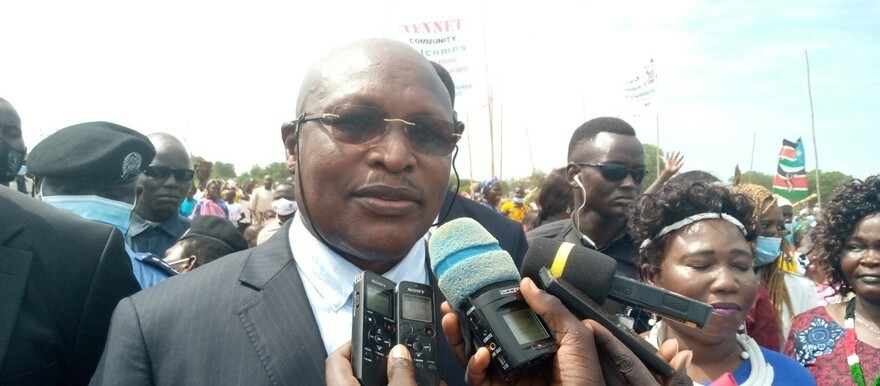Eastern Equatoria State governor Louis Lobong Lojore has made a strong appeal to citizens, calling for cost-sharing in a wide range of essential services aimed at improving livelihoods.
The governor’s call was made during a requiem mass held at Our Lady of Sorrow church in Kapoeta on Thursday, where former deputy governor Allan Lochul was honored. Allan Lochul, born in January 1950, passed away on July 2, 2023, in Nairobi. He had previously served as the Eastern Equatoria State Deputy governor during the Comprehensive Peace Agreement (CPA) era from 2005 to 2010. Subsequently, he became the chairperson of the referendum commission in Eastern Equatoria State.
Before his role as deputy governor, Lochul had served in various government positions, both at the national level and in the Kapoeta district during the Sudanese regime.
During the requiem mass, Governor Lobong addressed hundreds of mourners in Kapoeta, highlighting the issue of inadequate healthcare services in the country. He emphasized the need for advanced medical technologies for proper checkups and early disease detection, stressing that health, education, water, and food are essential aspects of a good life. The governor urged citizens to consider cost-sharing instead of expecting services to be provided for free.
Governor Lobong explained that the provision of free services has hindered the quality of hospitals and schools. He suggested that if individuals contributed financially during their visits to hospitals, the accumulated funds could be used to purchase the necessary medical equipment. Similarly, he emphasized the importance of paying for quality education and qualified teachers. The governor acknowledged that the government alone cannot afford to provide all the basic services required by citizens.
Idaha Jackline, a local resident, expressed skepticism about the feasibility of the governor’s proposal. She argued that the economic hardships faced by the people make it nearly impossible for them to contribute financially. While acknowledging that the idea could alleviate the burden on the government budget, she highlighted the prevailing economic challenges and the high prices of basic commodities.
“I don’t think the suggestion of the governor can be achieved. I say this because you know these days people are poor, there is no money and the situation in the market is worse as the prices of basic commodities is very high. Nonetheless, it is a good idea in the sense that it can ease the financial pressure on the government budget but the problem is that people nowadays have no money. We all know the economic situation is not good at all. If the government is able to provide these services that the governor has spoken about, it will be better for the ordinary citizens; but to expect citizens to contribute, I don’t think this is possible,” she said.
On the other hand, Angelo Losike, the paramount chief of Kapoeta North County, welcomed the governor’s initiative, stating that citizens are experiencing the absence of basic services. Chief Losike suggested that if people were encouraged to make small contributions, such as pooling resources to save the life of a sick person, it would be a positive step. He also stressed the importance of citizens not becoming solely reliant on the government but rather taking responsibility for their own well-being.
Governor Lobong’s call for cost-sharing in service delivery aims to address the limitations of government capacity. While there are differing opinions on the feasibility of this approach, the paramount chief of Kapoeta North County supports the idea as a means to encourage self-reliance and enable government and humanitarian organizations to address the challenges faced by the people.




